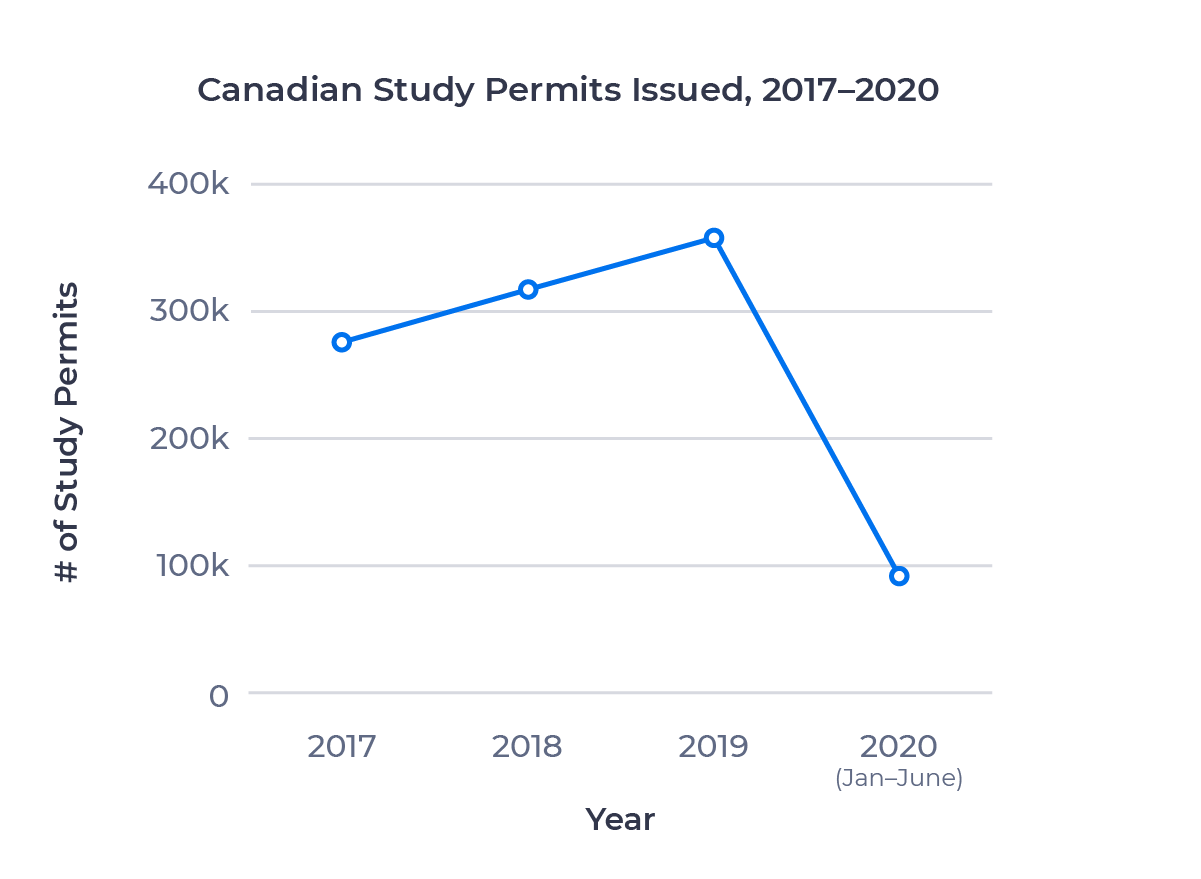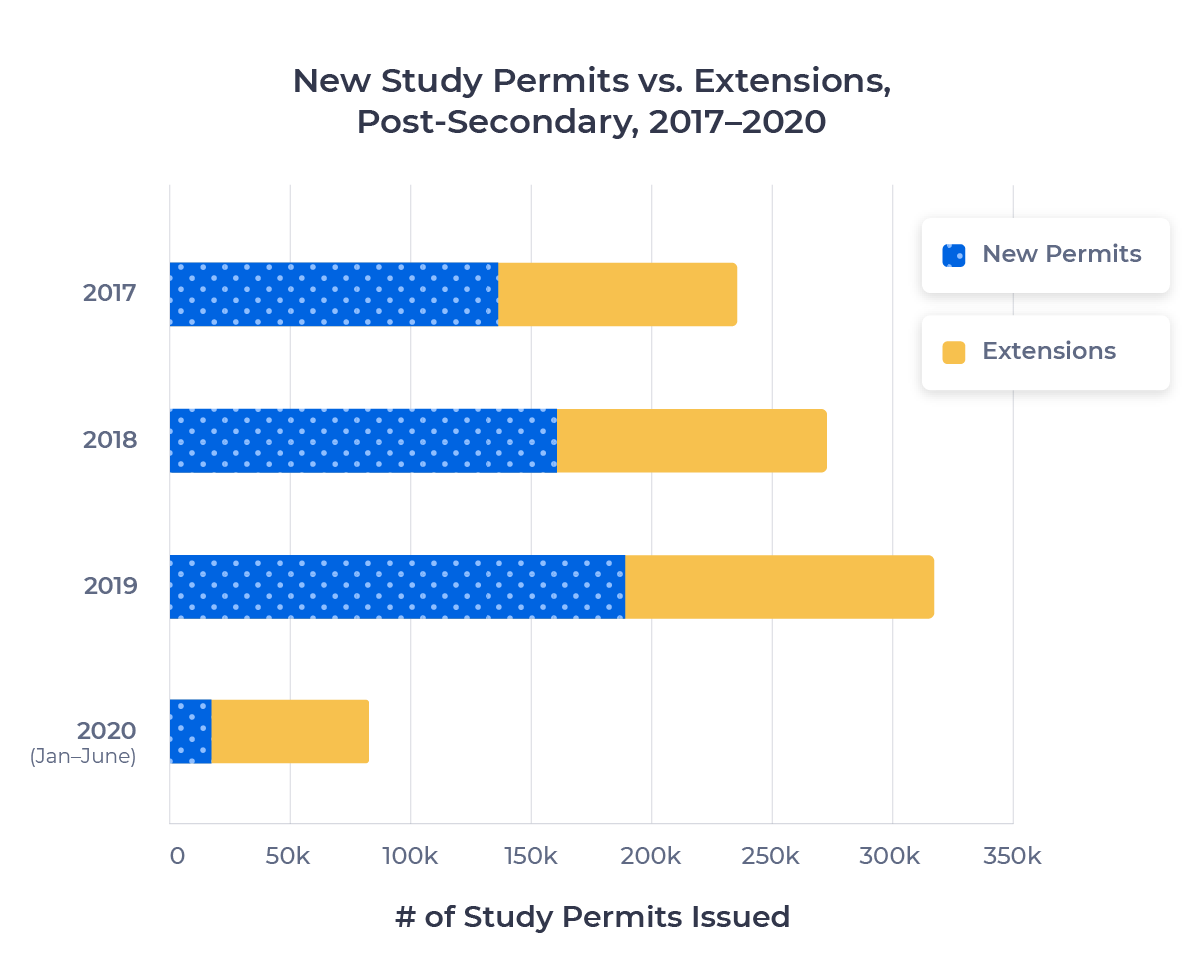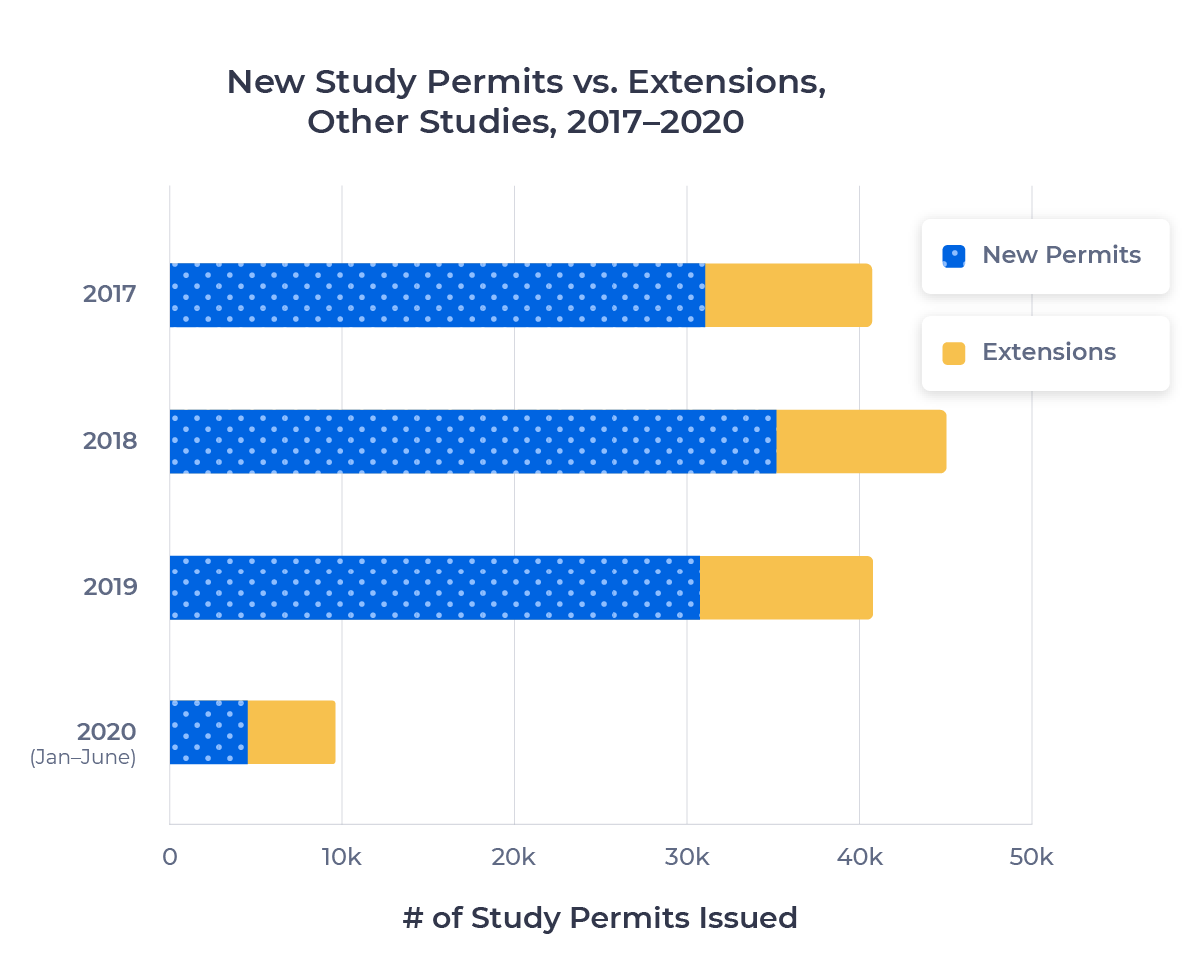In this edition of ApplyInsights, I’ll be looking at the impact the COVID-19 pandemic has had on the international student market in Canada. Back in August, ApplyBoard conducted a survey of over 500 recruitment agents on how the pandemic has affected their business. Today, we’ll be examining data from the school side, looking at just how much enrollment numbers have declined in 2020.
Here’s what this blog post will cover:
- The number of Canadian study permits issued in the first half of 2020, contrasted with the number issued over the previous three years
- Canadian study permit trends across two study levels: post-secondary education, and the Other Studies category
This article uses study permit data from Immigration, Refugees and Citizenship Canada (IRCC). If a study permit is issued before a student begins their studies, the IRCC classifies it as a new study permit. If a student finishes their program and wishes to continue studying in Canada, or if they will finish their studies later than originally expected, they need to apply for a study permit extension. In this article, we’ll be looking at numbers for both new study permits and study permit extensions.
Canadian Study Permit Trends, 2017 to 2020
The following chart shows the number of Canadian study permits and extensions issued in 2017, 2018, and 2019, as well as the first six months of 2020:
Instead, we saw 92,954. That’s a 25% reduction in the number of study permits issued. If we assumed 14% growth in the market between 2019 and 2020—in line with the growth we saw over the previous two years—we would expect 145,000 study permits to be issued through June. Using this model, 35% fewer study permits than expected were issued in 2020.
The Impact of COVID-19 in Canada by Study Level
Let’s examine this data by study level, breaking it down by new study permits and extensions. We’ll start with the post-secondary sector.
Post-Secondary
During the first six months of 2020, 83,306 students received study permits or extensions for post-secondary studies in Canada.
Assuming average year-over-year growth for the sector (16.1%) and a sector-average proportion of study permits issued in the first half of the year (33.0%), we would expect to see around 120,000 study permits issued over that period. This gives roughly a 30% shortfall in study permits issued, slightly ahead of the 35% shortfall for all sectors.
The following chart shows the breakdown of new permits and extensions for the post-secondary sector:
Only 10% as many new study permits as were issued in 2019 were issued in the first half of 2020, versus more than 50% as many extensions.
Unfortunately, data on the distribution of new study permits and study permit extensions across the two halves of the year isn’t available. However, with the post-secondary academic year in Canada typically running from September to April, we can infer that a large proportion of extensions are processed in the first half of the year. Students either complete their programs and decide to pursue additional study, or they recognize that they won’t be able to complete their studies by the date specified on their study permit and apply for additional time.
Even taking this into account, it’s clear that there was a much more significant drop in new permits than extensions in the first half of 2020—exactly what we might expect to see in a situation where international travel was limited. International students who were already in Canada appear to have largely decided to continue their studies, either in Canada or online from their home country, while many students who might otherwise have gone abroad elected to defer their plans.
Other Studies
IRCC’s Other Studies designation includes a number of different cases, such as students taking language training programs, students enrolled in Quebec-specific vocational programs, and spouses of international students that hold a study permit themselves.
During the first six months of 2020, Other Studies students received 9,648 study permits and extensions. The Other Studies sector grew just 0.6% per year from 2017 to 2019. If we factor that in, along with a sector-average distribution of study permits issued in the first half of the year (40.6%), we would expect to see around 16,700 study permits issued in the first half of 2020. That gives roughly a 40% shortfall, a little worse than the overall rate (35%).
Breaking down new permits and extensions, we have the following:
It’s not clear why Other Studies programs would have more resilient study permit numbers than post-secondary studies. One possibility is the spousal component. If more families moved ahead with their work and study abroad plans despite the pandemic, the numbers for spouses of students issued study permits might hold up better than the overall statistics, helping the Other Studies numbers.
Looking to the Future
It’s easy to get discouraged looking at these numbers, and it’s true that international student enrollment in Canada has been hit hard by the COVID-19 pandemic. But as I’ve mentioned in previous articles, there’s cause for optimism about the Canadian international student market for a number of reasons:
- The Canadian government has taken critical policy steps to support international students. Last week, the government amended travel restrictions that will allow international students attending schools with a government-approved COVID-19 readiness plan to come to Canada on or after October 20.
- In our survey of recruitment agents on the impact of COVID-19 on their business, agents ranked Canada above Australia, the UK, and the US for its handling of the pandemic, leaving Canada well positioned relative to those other countries.
- Q3 typically sees a large volume of applications come in, and at ApplyBoard, we’ve seen a huge uptick in submissions over the past month. In fact, September 2020 was the all-time top month for Canadian applications on our platform.
Thanks to proactive interventions by schools and government and hard work and commitment throughout the industry, the international education landscape in Canada looks better today than at any point since the onset of the pandemic. I’m confident that things will continue to improve despite the ongoing public health challenges, and I hope the numbers I’ve shared today will provide valuable additional context as we all continue to work together to drive student success in this difficult time.
Keep an eye on ApplyInsights for more on this critical topic in the coming weeks.
Subscribe to ApplyInsights
Sign up for the latest insights on international education.
 Meti Basiri
Meti Basiri
Co-Founder and Chief Marketing Officer (CMO)
Meti is driven by the belief that education is a right, not a privilege. He leads the International Recruitment, Partner Relations, and Marketing teams at ApplyBoard, working to make education accessible to people around the world. Meti has been instrumental in building partnerships with 1,200+ educational institutions across North America and the United Kingdom. Working with over 4,000 international recruitment partners, ApplyBoard has assisted over 100,000 students in their study abroad journey. Follow Meti on LinkedIn for more access to ApplyInsights and key industry trends.



